Biosecurity is the management of the risk of pests and diseases entering, emerging, establishing or spreading in Australia and causing harm to animals, plants or human health, the economy, the environment and the community.
Heightened measures to resume with new safeguards to keep BMSB out
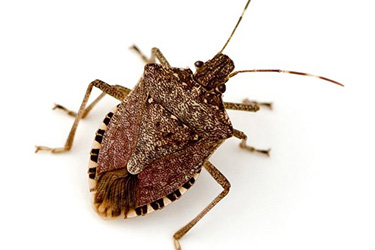
Seasonal measures protect our agricultural industries from Brown marmorated stink bug.
The department will implement strengthened seasonal measures to prevent a serious biosecurity threat, the Brown marmorated stink bug (BMSB) from establishing in Australia.
With the 2018-19 BMSB risk season just finishing, work is well advanced for the next season commencing again in September.
Peta Lane, head of Biosecurity Compliance, said the rapid expansion of BMSB throughout Europe and North America created real challenges for industry and the department, and that we are working together to better protect our agricultural industries from this hitchhiking pest.
‘Preventing an incursion in the first place is a high priority for the Australian Government and industry—a BMSB incursion would be extremely difficult and expensive to manage,’ said Ms Lane.
Continue reading about heightened measures to resume with new safeguards to keep BMSB out
‘For the 2019–20 BMSB risk season, measures will apply to certain goods manufactured in, or shipped from target risk countries, and vessels that berth at, load or tranship from target risk countries.
‘The measures apply to goods and vessels between 1 September 2019 and 31 May 2020.
‘As with previous BMSB risk seasons, everyone must comply with these measures, including mandatory treatment for goods and vessel inspections.
‘Non-compliance will be treated very seriously and may result in goods being destroyed or re-exported.
‘It’s everyone’s responsibility to continue to ensure that any goods imported, are free of biosecurity risk material throughout the year, not just during periods of heightened seasonal measures to manage hitchhiker pests such as BMSB.’
Everyone has a role to play in protecting our $60 billion agriculture industry as well as our unique environment, native flora and fauna, our tourism industries and lifestyle.
If you see something that could have entered Australia with imported goods report it to See. Secure. Report. on 1800 798 636 or complete the online form.
Find out more about the 2019-20 BMSB seasonal measures.
New web series calls for biosecurity champions
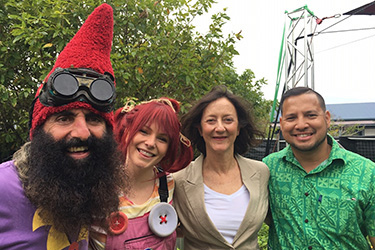
Encouraging locals and visitors to become biosecurity champions are (L to R) Costa the Garden Gnome, dirtgirl, head of Biosecurity Lyn O’Connell and head of Science and Surveillance Group Wayne See Kee.
The Department of Agriculture has released ‘Country—Handle with Care’, a new web series that calls on locals and visitors to do their part to protect the top of Australia from the biosecurity risk of pest and disease.
The seven-part series features biosecurity officers, scientists and our Indigenous rangers who work on the frontline to help safeguard Australia’s environment, plant, animal and human health against pest and disease risks.
Lyn O’Connell, head of Biosecurity, said the series features well-known television personalities who share the department’s commitment to biosecurity.
‘Biosecurity is everyone’s business and now, more than ever, we must all learn to recognise the key threats as they occur and take action to stop them in their tracks,’ said Ms O’Connell.
‘Country—Handle with Care shows that we all have a role to play.
‘Our biosecurity champions are supported by family favourites, Costa the Garden Gnome, dirtgirl and scrapboy. It also features horticulturists, farmers, fishers and tourism operators.
Continue reading about new web series calls for biosecurity champions
‘I encourage everyone to get involved and view the web series so we can all do our part to keep Australia healthy and clean.’
The series tackles a wide range of pest and disease risks, including Asian honey bees, Queensland fruit fly and Asian green mussel, which all pose a significant risk for Australia.
More importantly it highlights what visitors and locals can do to be biosecurity aware, such as keeping an eye out and reporting potential biosecurity risks.
Find out more on how you can be a biosecurity champion.
Visa changes protect Australia

If you’re visiting Australia, don’t be sorry, just declare it.
Biosecurity officers and Australian Border Force officers at our air and sea ports have more powers to protect Australia from biosecurity threats, following changes to Australia’s immigration law on 17 April.
Amended legislation is now in effect to deter and respond to biosecurity breaches at international airports. International visitors who are believed to have contravened particular provisions of the Biosecurity Act 2015 can have their visitor visa cancelled for up to three years.
Peta Lane, head of Biosecurity Compliance, said it is more important than ever for travellers to be prepared and know their obligations before travelling to Australia.
‘You could face serious consequences If you fail to answer questions about goods, don’t follow directions given by a biosecurity officer or provide false or misleading information on your Incoming Passenger Card,’ said Ms Lane.
Continue reading about visa changes protect Australia
Biosecurity officers use 3D X-ray machines, detector dogs and inspections to screen travellers and their baggage for harmful pests and diseases.
‘If you don’t comply with our biosecurity laws, you could have your visa cancelled for up to three years.
‘Food, plant products and animal material from overseas have the potential to introduce serious pests and diseases into Australia.’
Everyone has a role to play in protecting our $60 billion agriculture industry as well as our unique environment, native flora and fauna, our tourism industries and lifestyle.
Take the time and view our travelling to Australia video and remember, don’t be sorry, just declare it.
New rapid tests for bluetongue virus
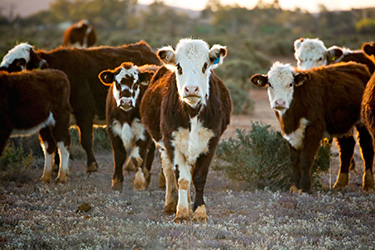
New rapid molecular tests have been developed to identify bluetongue virus in Australian cattle.
New rapid molecular tests have been developed to identify bluetongue virus (BTV).
BTV is an insect-borne virus than can infect sheep and cattle, with some strains potentially causing significant upper respiratory disease in sheep. Over 26 strains have been identified worldwide, with some present across northern Australia and parts of eastern Australia.
Australia is fortunate to be free from the BTV 8 strain which causes significant disease in sheep and has major implications for trade and market access.
These new tests cut the result time from weeks or months to just a few hours. This will also allow us to test for more than one strain at a time.
Dr Mark Schipp, Australia’s Chief Veterinary Officer, said these tests will improve our ability to identify exotic strains of BTV.
Continue reading about new rapid tests for bluetongue virus
‘A detection of BTV would have a significant impact on our trade in live animals, semen and embryos. Improving the way we monitor BTV distribution in Australia also provides greater assurance to trading partners and supports the future of our livestock trade.
‘When we detect a potential disease like BTV, we need the strain confirmed as soon as possible so we can take the appropriate steps to manage it.’
The tests were developed as a partnership between the Elizabeth Macarthur Agricultural Institute within the New South Wales Department of Primary Industries, the CSIRO’s Australian Animal Health Laboratory and the Berrimah Veterinary Laboratory within the Northern Territory Department of Primary Industry and Fisheries.
Development of the tests was supported by a $350,000 investment through the Agricultural Competitiveness White Paper, as part of our work to strengthen biosecurity surveillance and analysis.
Tracking biosecurity trends with enhanced intelligence

Modern IT systems enhance intelligence capabilities.
New features have been added to the International Biosecurity Intelligence System (IBIS) to enhance our intelligence capability.
IBIS is a web-based application that searches the internet for biosecurity information from all over the world. It generates reports to assist in the early identification of new and emerging biosecurity threats to help us manage biosecurity risks.
The department is committed to managing biosecurity risks through good biosecurity risk research. Data and intelligence is integral to informing our approach.
The number of people and goods coming into and out of Australia each day is huge, and volumes are set to significantly increase between now and 2025. Our biosecurity research, development and extension priorities provide a shared vision for biosecurity research to underpin and support change. IBIS is a perfect example of this work in action.
To make the most of IBIS, new features are being added such as forecasting, visualisation and greater foreign language translation. The department has recently expanded the use of the system including to monitor global animal welfare and trade issues.
Development of IBIS was a joint research project between the department and the Centre of Excellence for Biosecurity Risk Analysis. The department’s work on IBIS was partly supported through the Agricultural Competitiveness White Paper, as part of our work to improve information and analytical capability.
To find out more, visit the International Biosecurity Intelligence System.
Collaboration in the north
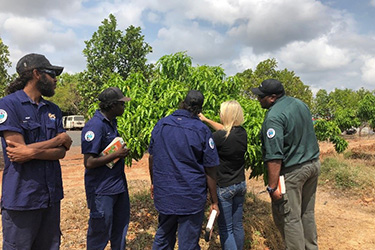
Indigenous rangers visiting properties as part of the Biosecurity Fundamentals training.
Our staff have been working with communities in northern Australia to build biosecurity awareness and capability in the area.
Darwin has a large community of Vietnamese and Cambodian horticulture and vegetable growers. Many of these growers speak English as a second language. For government and industry, meeting the information and communication needs of diverse audiences can be challenging.
Since 2018, our Northern Australia Quarantine Strategy team have been delivering the biosecurity engagement project with Northern Territory (NT) Farmers and the NT Department of Primary Industry and Resources (NTDPIR).
Wayne See Kee, head of Science and Surveillance, said northern Australia is a unique landscape with a melting pot of cultures and communities from across Australia and the world.
Continue reading about collaboration in the north
‘The project aims to increase on-farm biosecurity practices through the employment of a Biosecurity Engagement Officer within NT Farmers. Chris Pham, who is from a Vietnamese grower family, has been in the role since 2018,’ said Mr See Kee.
‘Chris has been active in communicating biosecurity messaging in a culturally and linguistically appropriate way, whilst acting as a conduit between growers and government.’
NAQS and NTDPIR have also been conducting joint surveys on grower properties, facilitated by Chris Pham. The first survey took place in late October 2018, with five properties surveyed. There is a second survey scheduled for June 2019.
‘In recent years growers have been impacted by cucumber green mottle mosaic virus, banana freckle and citrus canker, which has affected relationships and trust with government. These surveys provide a platform to undertake proactive surveillance with growers outside of a response, whilst building positive relationships and biosecurity capability,’ said Mr See Kee.
NT Farmers have also helped indigenous rangers visit grower properties as part of their ‘Biosecurity Fundamentals’ training. For many rangers, this has been their first opportunity to experience an agricultural property and see how their biosecurity surveillance in remote Australia links back to the farm gate.
This project has been supported by the Agricultural Competitiveness White Paper, as part of our work to strengthen biosecurity surveillance and analysis.
Interesting finds: from Russia with love
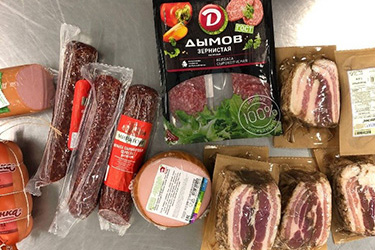
Concealed pork products found in a passenger’s luggage at Brisbane Airport.
Biosecurity officers found a snag in the story of a recent traveller who arrived at Brisbane Airport with a bag full of the wurst products.
The passenger arriving from Russia decided not to declare their meat products because they were packaged.
They wrongly believed that once the meat was processed, vacuum sealed and packaged, it no longer needed to be declared.
Biosecurity officers informed them this wasn’t the case. The goods were destroyed and the passenger was issued with an infringement notice.
Meat products pose a huge risk to our agricultural sector. Especially as foot-and-mouth disease (FMD) and African swine fever (ASF) are currently spreading through other countries.
An outbreak of ASF or FMD would have significant impacts on our billion dollar meat industries and the livelihoods of thousands of Australians.
The meat may have come from Russia with love but our GoldenEyed officers have a licence to kill exotic pests and diseases.
Remember, don’t be sorry, just declare it.
Find out more about bringing or mailing goods to Australia.
Interesting finds: slippery snake

A highly venomous Spitting Cobra.
Slippery stowaways come in all shapes and colours… and danger levels.
A cargo ship crew were hisssterical when they came across a highly venomous Spitting Cobra. These snakes can grow up to 1.6 metres long and can spit venom with deadly accuracy, blinding would-be predators.
Upon further inspection, the slithery stowaway hadn’t survived the journey and posed no threat to the crew. Biosecurity officers alerted the crew who took the deceased cold-blooded hitchhiker away.
Exotic pests, diseases and weeds can hitch a ride to Australia with vessels, shipping containers and break-bulk cargo. If they establish here they can wipe out entire food crops, harm our animals and damage our beautiful environment. Some pests could even change our way of life forever.
The department manages these risks with stringent import conditions. But we also need your help.
If you unload, process or transport imported cargo at or away from our ports, keep a look out for insects, animals, plant matter and soil.
Biosecurity is everyone’s responsibility. So if you see or receive something that might be a biosecurity threat, call our See. Secure. Report. hotline on 1800 798 636 or complete our report a pest or disease concern online form.
Find out more about cargo pests.
Casual vacancies for biosecurity officers

Biosecurity officer inspects incoming cargo.
We are looking for people who care about keeping Australia free of damaging pests and diseases.
Enjoy the freedom of working as a casual biosecurity officer and help safeguard Australia’s natural resources.
You’ll enjoy flexible hours and rewarding work that offers a real sense of responsibility. You’ll have the opportunity to make a difference every day.
Apply now for casual positions.
We want your input

The department is seeking feedback on:
- A risk analysis for fresh strawberry fruit from Japan.
- Risk management measures for the processing of imported chicken meat.
The Australian Bureau of Agricultural and Resource Economics and Sciences is conducting a national survey on pest animal and weed management.
See the latest Import industry advice notices or Export industry and market access notices.
